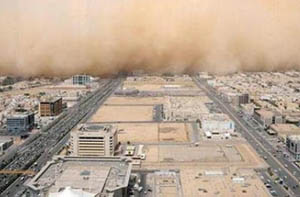 Riyadh, Mar 12: Riyadh has been ranked one of the most polluted cities in the world, according a report released by a United Nations organization.
Riyadh, Mar 12: Riyadh has been ranked one of the most polluted cities in the world, according a report released by a United Nations organization.
The World Health Organization (WHO) report named Ahvaz, the capital of the Khuzestan Province in Iran, to be suffering the worst levels of air pollution, followed by Ulan Bator in Mongolia.
The list also included Lahore, New Delhi, Riyadh, Cairo, Dhaka, Moscow, Mexico City and Beijing, the report said.
The WHO report attributed the inclusion of Riyadh in the list to the occurrence of sandstorms, as well as pollutants emerging from heavy traffic and industrial waste.
Last week, Riyadh Gov. Prince Khalid bin Bandar ordered the formation of a committee to look into sources of pollution in southern Riyadh, where citizens have often complained of pollution in the area’s districts.
Committee members representing a series of government agencies, such as the Higher Commission of Development of Riyadh (HCDR), the Riyadh Governorate, the Ministry of Health, the Saudi Industrial Property Authority (Modon) and the National Water Co., are entrusted to put forth urgent solutions for reducing sources of pollution in the area.
An earlier report published by the WHO put North American and Australian cities among the world’s cleanest in terms of air quality. By contrast, seven Asian cities were among the worst globally.





Comments
Add new comment